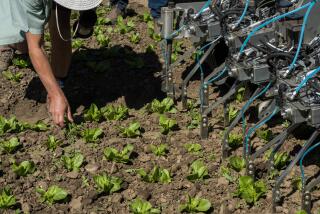If Warming Trend Bugs You, Think Profit
As the specter of global warming looms, a nagging question haunts my thoughts: How can I make a profit from this?
Solar-powered air conditioners? No. Ultra-protective sunscreen lotions? Not sexy enough. Real estate on the Nevada coastline? Too speculative. No, I want access to a multibillion-dollar global opportunity with maximum growth potential. I want a sure thing.
If, as the experts insist, the world really is undergoing a fundamental climatic shift toward higher average temperatures, then that sure thing will be swarming with a vengeance. The clear winners in the thermal ecology sweepstakes will be insects. Cockroaches, locusts, aphids, Medflies, fire ants, mosquitoes and other loathsome pests all breed faster and more vigorously as the thermometer creeps up. Even tiny variations in temperature could translate into enormous ecological advantage for opportunistic insects.
Early U.S. Department of Agriculture efforts to model the potential impact of global warming all reveal “the common theme (that) pests, overall, would become more of a problem,” notes David R. MacKenzie, who oversees much of the USDA’s scientific research. Of course, insects are already annually responsible for billions of dollars in crop destruction. The prospect of even more hospitable climes for these invertebrate pests is not pleasant.
“The insects are already winning,” says MacKenzie. “The use of pesticides is up but so is the amount of crop loss. We’re losing more now than we ever had. . . . We’ve pushed the traditional system to its limit, and that’s where we are having our problems.”
The $20-billion global market in conventional weapons of chemical pesticides consequently needs rethinking. Ecologists, entomologists and agribusiness folk are growing more enthusiastic about the potential of biopesticides--targeted pest-specific technologies designed around biological principles, as opposed to the traditional chemical weapons of multispecies mass destruction.
“There are tremendous opportunities for agricultural biopesticides,” asserts Leo Kim, chief technical officer at Mycogen, a San Diego-based agrigenetics company that’s expected to win Environmental Protection Agency approval this month for the first genetically engineered biopesticides. Mycogen’s scientists have cloned a pest-deadly toxin from a microorganism known as Baccillus thuringiensis and plugged it into another bacterium to be mass-produced. These bacteria are then killed, encapsulated and sprinkled on the crops to be ingested by the target insect--in this case, the Colorado potato beetle.
But that’s the obvious way of biotech pest-busting. In fact, genetic engineering technologies--combined with a greater knowledge of plant/pest biologies and ecologies--offer a cornucopia of provocative options to keep noxious insects at manageable levels. The technology can engineer greater pest-resistance in the plant, provide microbial organisms to shield the crop or ruthlessly target the insect itself. The USDA should be to molecular biology and gene mapping of plants and pests what the National Institutes of Health are to molecular biology and gene mapping for human health.
Pheromones can be tailored to draw insects into toxin-laden killing grounds; sex hormones can be designed to ruin the mating periods or produce exoskeletal eunuchs; houseplants can be exquisitely engineered to become virtual Venus Flytraps capable of inflicting death upon houseflies, roaches and other insect vermin that enjoy urban living.
“I think you will also see people take an approach to virus design,” says Mycogen’s Kim. “We will consider that approach as well.” In other words, biopesticides can move us from the biblical plague of locusts to a plague for locusts. Viruses that corrode insect nervous systems, chew away their chitin shields and undermine their vital enzymes may become an option if these creatures threaten to get out of hand.
A little blend of creativity, ecology and molecular biology can go a long way. The future of “integrated pest management” (IPM) will see a veritable symphony of biotechnological tactics, tricks and techniques in order to prevent insect populations from building up immunities. Indeed, the goal shouldn’t be to rely on biopesticides to wipe out insect pests (no matter how pleasant that prospect may be) but to bring them down to levels that natural predators can comfortably contain them.
“Once you commit to the IPM mode, anything you do with chemicals breaks that ecological cycle,” says Kim. “You don’t nuke the whole field, you practice a regime of selectivity and balancing out nature. . . . (For example), in California, if you can keep the mosquito population down for a critical 21 to 22 days, then the natural predators will take over.”
Unfortunately, too much of the Agricultural Establishment is bringing the conventional chemical pesticide mind-set to the more holistic and ecologically sophisticated integrated pest management system. If that happens, says Friends of the Earth senior analyst Jack Doyle, “we’re trading a genetic treadmill for a chemical one” as insect populations gradually adapt to the genetic weapons as surely as they’ve adapted to chemical pesticides. “Single-gene silver-bullet fixes are not the way to go,” he warns.
“I don’t think there is a single strategy that the pest population couldn’t overcome,” says the USDA’s MacKenzie, “If there’s anything we’ve learned, it’s that their population dynamics and flexibility are still dazzling. . . . That has a lot of us really frightened about whether we are smart enough to do this.” Because, MacKenzie notes, the last thing a biopesticide should do is make a pest population even more hardy and vital.
“We fully recognize that, and we’re working continually on these strategies,” says Gary R. Evans, the USDA’s chief scientist for global change issues. Even if global warming had no direct effect on insect population, Evans notes, biopesticides and genetically engineered arsenals for pest management would still be necessary as traditional chemical pesticides lose their effectiveness and the public increasingly demands “natural” foods free of chemical taint.
But if the Greenhouse Effect plays a role in making life easier for insects, then there is no way that biopesticides won’t be one of the most profitable--and welcome--business opportunities around.
More to Read
Inside the business of entertainment
The Wide Shot brings you news, analysis and insights on everything from streaming wars to production — and what it all means for the future.
You may occasionally receive promotional content from the Los Angeles Times.










